
Hypericum is a genus of flowering plants in the family Hypericaceae. The genus has a nearly worldwide distribution, missing only from tropical lowlands, deserts and polar regions. Many Hypericum species are regarded as invasive species and noxious weeds. All members of the genus may be referred to as St. John's wort, and some are known as goatweed. The white or pink flowered marsh St. John's worts of North America and eastern Asia are generally accepted as belonging to the separate genus TriadenumRaf.
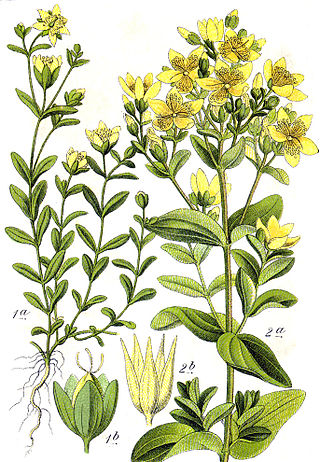
Hypericum tetrapterum is a herbaceous perennial plant species in the flowering plant family Hypericaceae. Its common names include St. Peter's wort, Peterwort, square stemmed St. John's wort, and square stalked St. John's wort.

Hypericum maculatum, commonly known as imperforate St John's-wort, or spotted St. Johnswort, is a species of perennial herbaceous flowering plant in the family Hypericaceae. It is native to Europe and Western Asia where it grows in moist meadows.
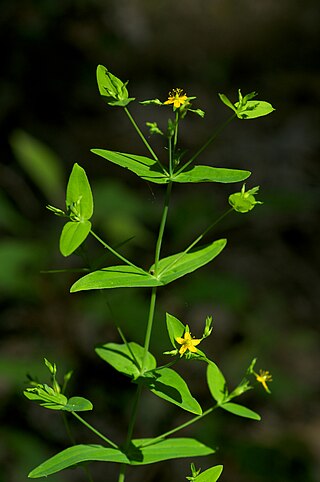
Hypericum mutilum is a species of St. John's wort known by the common name dwarf St. John's wort. It is native to parts of North America and is present in other parts as an introduced species. It is an annual or perennial herb taking a multibranched erect form up to about 60 centimeters tall. The oval green leaves are one or two centimeters long and are covered in tiny glands. The inflorescence is a compound cyme of tiny flowers. H. mutilum subsp. mutilum and subsp. boreale have a diploid number of 16, and H. mutilum subsp. boreale can have a diploid number of 18.
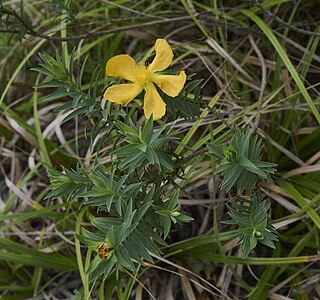
Hypericum terrae-firmae is a woody perennial flowering plant in the St. John's wort family Hypericaceae. It is an endemic plant species of Belize.
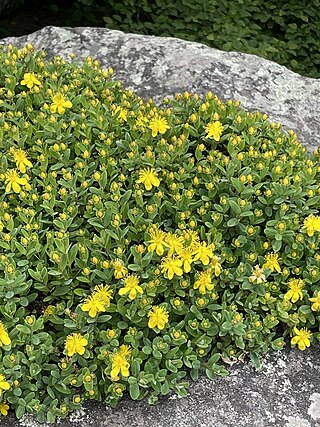
Hypericum buckleyi, known as Blue Ride St. John's wort and Buckley's St. Johnswort, is a rare species of flowering plant in the family Hypericaceae found only in the Appalachian Mountains of the southeastern United States. The species is listed in the state of Georgia (S1), South Carolina (SX), and North Carolina (S3).
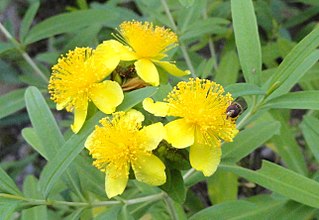
Hypericum kalmianum, commonly called Kalm's St. Johns wort or Kalm's St. Johnswort, is a flowering plant in the St. John's wort family Hypericaceae. It is native to the Great Lakes region in the northern United States and southern Canada. Hypericum kalmianum was named after its discoverer, Swedish botanist Pehr Kalm (1715-1779).

Hypericum hookerianum, or Hooker's St. John's Wort, is a perennial shrub in the flowering plant family Hypericaceae native to eastern and southern Asia. The specific name hookerianum is named for William Jackson Hooker.

Hypericum canadense, known as Canadian St. Johns-wort, lesser St. John's wort, and lesser Canadian St. Johnswort, is a flowering plant in the genus Hypericum. It is a yellow-flowering annual or perennial herb native to North America and introduced to Ireland and The Netherlands. The specific epithet canadense means "Canadian".

Hypericum prolificum, known as shrubby St. John's wort, is a deciduous shrub in the genus Hypericum. It was named for its "prolific" number of stamens.

Hypericum tenuifolium, known as Atlantic St. John's-wort and sandhill St. John's-wort, is a species of flowering plant in the St. John's wort family, Hypericaceae. It is native to the Southeastern United States.

Hypericum suffruticosum, known as pineland St. John's-wort, is a species of flowering plant in the St. John's wort family, Hypericaceae. It is native to the Southeastern United States.
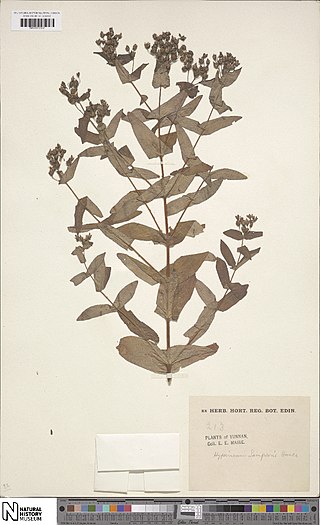
Hypericum sampsonii is a species of flowering plant in the St. John's wort family, Hypericaceae. It occurs in China, Taiwan, Japan, Myanmar, and Vietnam. It is one of two species of Hypericum in the section Hypericum sect. Sampsonia.
Hypericum galioides, the bedstraw St. Johnswort, is a species of flowering plant in the St. John's wort family, Hypericaceae. It is endemic to the Southeastern United States.

Hypericum tetrapetalum, the fourpetal St. Johnswort, is a species of flowering plant in the St. John's wort family, Hypericaceae. It is found in the Southeastern United States and Cuba. It was first described by Jean-Baptiste Lamarck in 1797.
Hypericum assamicum is a species of flowering plant in the St. John's wort family, Hypericaceae. It is endemic to India. Hypericum assamicum is one of two species of Hypericum in the section Hypericum sect. Sampsonia.

Hypericum virginicum, the marsh St. Johns-wort or Virginia marsh St. Johnswort, is a species of flowering plant in the family Hypericaceae. It is native to the central and eastern United States and eastern Canada.

Hypericum frondosum, the cedarglade St. Johnswort or golden St. John's wort, is a species of flowering plant in the St. John's wort family, Hypericaceae. It is native to the central and southeastern United States in dry, rocky habitats.

Hypericum coris, the heath-leaved St. John's wort, also called yellow coris, is a species of flowering plant in the family Hypericaceae, and is the type species of sect. Coridium. It is a low shrub, and it is found in Switzerland and northwestern Italy. The species has been a popular garden plant since the 18th century, valued for its long flowering period and for how well it adapts to cultivation.

















